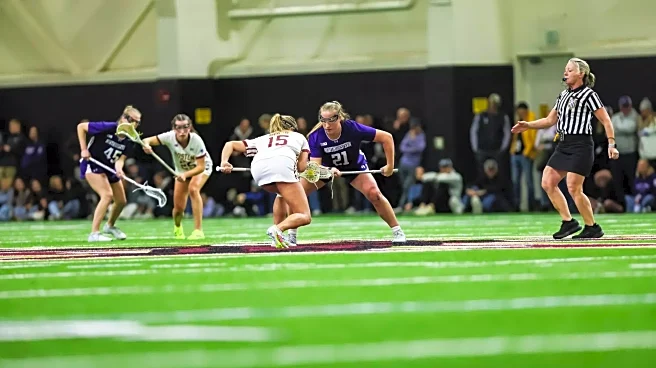What's Happening?
Howard Drew, a prominent African American sprinter from Springfield High School in Massachusetts, is featured in a historical series for his remarkable performance in the 100-yard dash. On November 16, 1912, Drew equaled the previous record of 10 1/5
seconds at the 23rd Regiment Games held in Brooklyn, New York. Despite being 21 years old, Drew's achievements in high school athletics were notable, although he did not receive full credit for a national high school record due to age restrictions. Drew was a favorite in the 1912 Olympic Games in Stockholm but had to withdraw due to a muscle injury. He later received a scholarship to the University of Southern California and equaled world outdoor records for 100 yards and 200 meters in 1914. Drew eventually pursued a career in law, earning a degree and working as an attorney.
Why It's Important?
Howard Drew's story is significant as it highlights the challenges and triumphs of early African American athletes in the United States. His achievements in track and field during a time of social and economic pressures reflect the broader struggles and successes of black athletes in the early 20th century. Drew's legacy serves as an inspiration and a reminder of the barriers that were overcome by minority athletes, paving the way for future generations. His inclusion in the historical series underscores the importance of recognizing and preserving the contributions of African American athletes to the sport and society.
What's Next?
The historical series 'National High School Records Through the Years' continues to explore and document significant achievements in high school athletics. This ongoing project aims to provide insights into the evolution of sports records and the athletes who set them. As the series progresses, it may uncover more stories of athletes like Howard Drew, offering a deeper understanding of the historical context and impact of their accomplishments.
Beyond the Headlines
Howard Drew's story also touches on the intersection of sports and education, as his athletic prowess led to opportunities in higher education and a professional career in law. This highlights the role of sports as a pathway to academic and career advancement, particularly for minority athletes facing societal challenges. Drew's journey from athlete to attorney exemplifies the broader cultural and social shifts that sports can influence, contributing to discussions on diversity, inclusion, and the empowerment of underrepresented groups.















